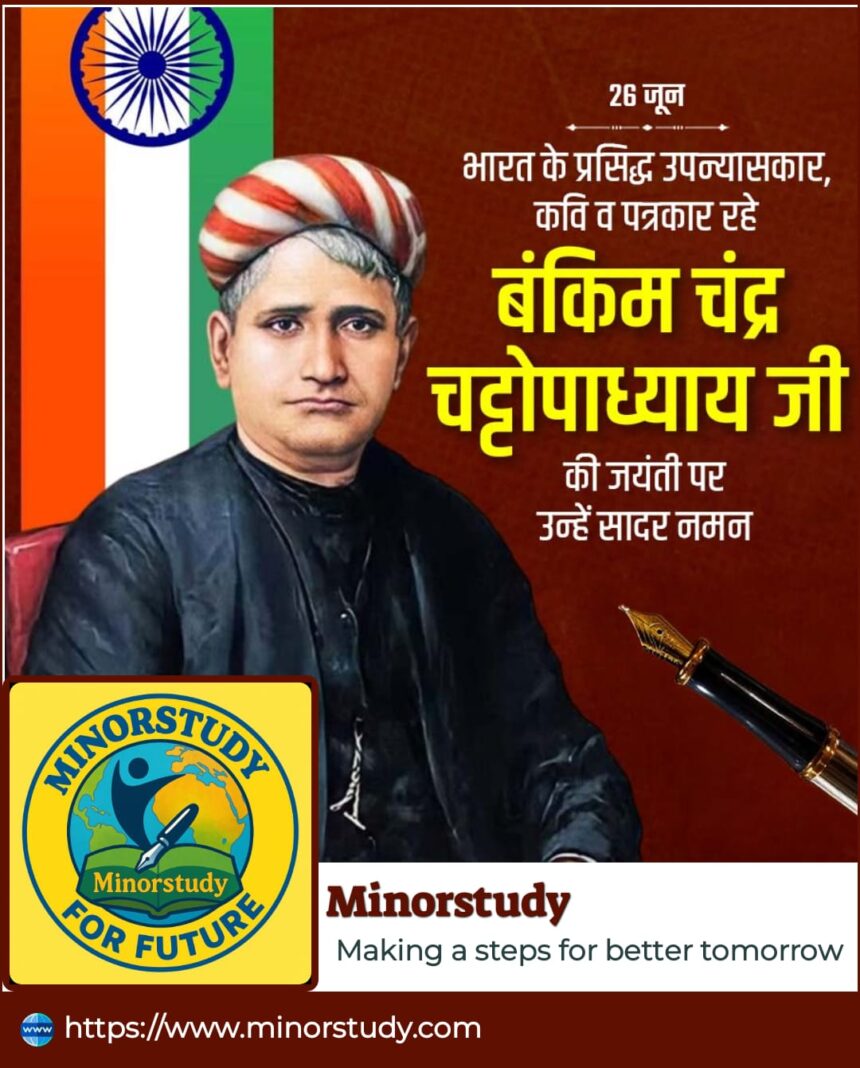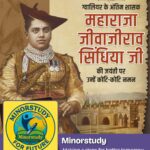📖 Introduction: The Pen That Stirred a Nation
Bankim Chandra Chatterjee: When India’s soul longed for inspiration under the weight of colonial rule, it wasn’t just swords that fought back—it was Bankim Chandra Chatterjee’s pen that sparked revolutions of thought. Known as the father of Indian nationalism in literature, Bankim Chandra was not just a novelist; he was a philosopher, poet, civil servant, and the composer of India’s national song, “Vande Mataram.” His words shaped the cultural consciousness of a nation, making him an eternal symbol of literary power and patriotic pride.
- 📖 Introduction: The Pen That Stirred a Nation
- 🕰️ Timeline and Life of Bankim Chandra Chatterjee
- 📜 History and Background
- 📚 Top Contributions and Fascinating Facts
- 1. ✍️ Pioneer of Indian Fiction
- 2. 🇮🇳 Composer of “Vande Mataram”
- 3. 🎓 Among First Indian Graduates
- 4. 🛡️ Voice of Patriotism
- 5. 📚 Prolific Author
- 6. 🏛️ Cultural Icon
- 7. 🧠 Thinker Beyond His Time
- 8. 🌏 Influence on Freedom Fighters
- 9. 📢 Reviver of Indian Pride
- ❓ Frequently Asked Questions (FAQs)
- 🔹 Why is Bankim Chandra Chatterjee important?
- 🔹 What language did he write in?
- 🔹 What is the significance of Anandamath?
- 🔹 Did he hold any official post?
- 🌟 Significance of Bankim Chandra Chatterjee in Indian Society
- 💥 1. Literary Father of Indian Nationalism
- 🗣️ 2. Voice of the Middle Class
- 🏹 3. Revival of Indian Ethos
- 🧩 4. Catalyst for Cultural Awakening
- 💬 Wishing Bankim Chandra Chatterjee on His Birth Anniversary
- 📌 Important Points to Remember
- 🧭 His Impact on Daily Life Today
- 🔚 Conclusion: More Than a Novelist, A Nation Builder
- 💡 Final Takeaway
🕰️ Timeline and Life of Bankim Chandra Chatterjee
| Year | Event |
|---|---|
| 1838 | Born on June 27 in Naihati, Bengal Presidency, British India |
| 1858 | Graduated from Presidency College, Calcutta – among the first graduates of the University of Calcutta |
| 1858–1891 | Served as Deputy Magistrate and Deputy Collector under British administration |
| 1865 | Published his first novel Durgeshnandini |
| 1872 | Wrote the landmark novel Anandamath containing “Vande Mataram” |
| 1891 | Passed away on April 8 at the age of 52 |
📜 History and Background
Bankim Chandra Chatterjee (also spelled Chattopadhyay) was born in an educated Bengali Brahmin family during a time of profound social and political upheaval. Growing up under British rule, he witnessed the erosion of Indian identity and dignity. But rather than choosing rebellion through arms, he picked up a mightier weapon—the pen.
He studied at Presidency College, graduating with honors in English literature, and later joined the Indian Civil Services, serving with distinction while subtly critiquing colonial oppression through his literature.
📚 Top Contributions and Fascinating Facts
1. ✍️ Pioneer of Indian Fiction
Bankim was the first major novelist in India to write in Bengali. His works helped establish prose fiction in Indian literature.
2. 🇮🇳 Composer of “Vande Mataram”
His novel Anandamath introduced “Vande Mataram”, which went on to become India’s national song and a mantra of revolution during the freedom struggle.
3. 🎓 Among First Indian Graduates
He was one of the first two graduates from the University of Calcutta in 1858, symbolizing a new era of Indian intellectual empowerment.
4. 🛡️ Voice of Patriotism
While working for the British, he carefully used his novels to foster nationalism, evoking Hindu cultural revivalism and pride.
5. 📚 Prolific Author
He wrote over 13 novels, many essays, and poems. His best-known works include:
Durgeshnandini (1865)
Kapalkundala (1866)
Mrinalini (1869)
Anandamath (1882)
Devi Chaudhurani (1884)
6. 🏛️ Cultural Icon
He redefined Bengali literature and was often referred to as the Walter Scott of India due to his rich historical narratives.
7. 🧠 Thinker Beyond His Time
His essays explored philosophy, religion, ethics, and national identity, often encouraging readers to reflect critically on society.
8. 🌏 Influence on Freedom Fighters
Mahatma Gandhi, Subhas Chandra Bose, and even Aurobindo Ghosh credited Bankim’s works for awakening their nationalist spirit.
9. 📢 Reviver of Indian Pride
He instilled a deep sense of civilizational pride at a time when colonial rhetoric demeaned Indian traditions.
❓ Frequently Asked Questions (FAQs)
🔹 Why is Bankim Chandra Chatterjee important?
He’s remembered as the first nationalist novelist of India and the creator of “Vande Mataram”, which became the rallying cry for India’s independence.
🔹 What language did he write in?
Primarily in Bengali, though he also contributed essays in English and edited journals such as Bangadarshan.
🔹 What is the significance of Anandamath?
Anandamath is a politico-spiritual novel that played a crucial role in shaping India’s nationalist sentiment, combining religion, revolution, and national pride.
🔹 Did he hold any official post?
Yes. He served as Deputy Magistrate and Deputy Collector in the British Indian administration.
🌟 Significance of Bankim Chandra Chatterjee in Indian Society
💥 1. Literary Father of Indian Nationalism
He merged nationalism with literature, giving emotional and cultural depth to India’s fight for freedom.
🗣️ 2. Voice of the Middle Class
Through relatable characters and themes, he represented the aspirations and struggles of common Indians under colonial rule.
🏹 3. Revival of Indian Ethos
Bankim revived the Vedic spirit in his literature—highlighting valor, sacrifice, and devotion to the motherland.
🧩 4. Catalyst for Cultural Awakening
His works planted seeds of cultural and intellectual awakening across Bengal and beyond.
💬 Wishing Bankim Chandra Chatterjee on His Birth Anniversary
On June 27, India fondly remembers and celebrates the literary and nationalistic genius of Bankim Chandra Chatterjee.
Sample Tribute Message:
“On this day, we bow to the literary giant who gave us ‘Vande Mataram’ and inspired a generation of patriots. Bankim Chandra Chatterjee’s words continue to echo in every Indian heart.”
📌 Important Points to Remember
Born: June 27, 1838 | Died: April 8, 1891
One of the first graduates of Calcutta University
Composer of the national song Vande Mataram
Wrote 13+ novels, many with nationalist themes
Inspired the freedom movement and Indian Renaissance
Blended fiction with patriotism, creating timeless literature
Revered as a Bengali and national icon
🧭 His Impact on Daily Life Today
🏫 In Education:
His works are studied in Indian literature curricula at universities across India.
Promotes value-based education, patriotism, and cultural awareness among students.
🎨 In Arts and Films:
His stories have inspired films, plays, and music, especially adaptations of Anandamath and Kapalkundala.
🇮🇳 In National Celebrations:
“Vande Mataram” is sung on Independence Day, Republic Day, and in political and cultural rallies as a symbol of national pride.
🧠 In Public Thought:
Continues to inspire modern writers, poets, and thinkers on issues of nationalism, identity, and ethics.
🔚 Conclusion: More Than a Novelist, A Nation Builder
Bankim Chandra Chatterjee was not merely a writer—he was a moral force, a philosopher, and an architect of Indian identity. At a time when India was losing faith in its own greatness, Bankim rekindled that flame with literature rooted in love for Bharat Mata.
His words, especially “Vande Mataram”, were not just lines in a book—they became weapons of mass awakening. In today’s India, where the soul of the nation still searches for unity and pride, Bankim’s voice remains a guiding light.
💡 Final Takeaway
If you ever doubt the power of words to build nations, read Bankim Chandra Chatterjee. In his verses live India’s pain, pride, and promise. And in remembering him, we don’t just honor the past—we reignite the future.









манхва экшн манхва на русском